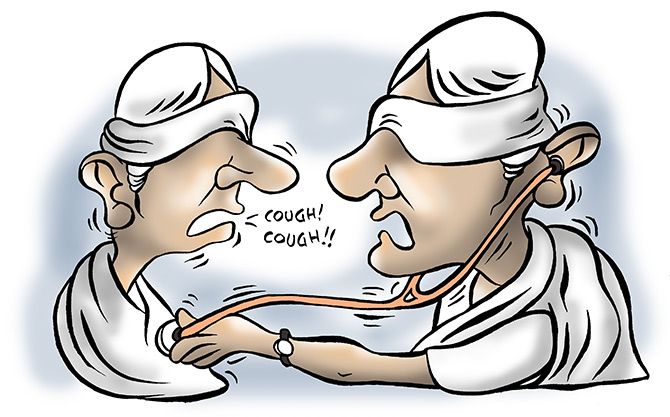While the judiciary remains our most trusted institution, it should debate its internal health, argues Shekhar Gupta.
Illustration: Uttam Ghosh/Rediff.com

If I am often allowed to slip cricket into deadly boring politics, I can also smuggle film music into this comment on our judiciary. Especially as I write this on the death anniversary of lyricist Anand Bakshi.
Remembering his era and thinking about the judiciary at the same time brought back to me the lines he wrote for the 1969 Ashok Kumar-Jeetendra-Mala Sinha starrer, Do Bhai.
Kumar and Mr Jeetendra are brothers, judge and cop. The rest is predictable, with the judge caught in that eternal dilemma, to punish or to forgive.
Bakshi scripted this for Mohammed Rafi as Is Duniya Mein O Duniyawalo, Bada Mushkil Hai Insaf Karna/Bada Aasan Hai Dena Sazayein, Bada Mushkil Hai Par Maaf Karna (briefly: Tough to be a judge when it's much more convenient to punish than to forgive).
While an editor's station in life is leagues below that of a judge, the same logic also applies to our lives: It is easier to publish and be damned than to refrain and explain.
It's a reckless editor who lets go of a juicy story only because it is a little unconvincing. The one I am bringing up here is to do with the then Chief Justice of India, in the winter of 1998.
If I am breaking confidences 20 years later and mentioning the names of a few wise and respectable people, they will forgive me because they will understand my reasons.
Our very solid legal editor worked on a meticulous investigation on the past of Justice A S Anand, who had just taken over as CJI.
It painted the picture of a judge who had cut corners, overlooked conflict of interest, wasn't transparent on gifts, and short-changed share-croppers on his lands.
The series went through many editing changes as we went over it in the most minute manner possible.
The story was big enough for me to personally take it to top lawyers for advice, say 10 of the then top 12.
The split, to publish or not, was about 2:8.
Reasons for not publishing, however, weren't always legal or factual.
Be careful, not to end up hurting an innocent and damage our greatest institution.
Of the two who said go ahead, one said facts were facts and no other logic should apply and the other was gung-ho.
What will the judge do, I asked him. Kill us with contempt?
He will do no such thing, all he will have left to do is commit suicide, he said.
That shook us up. Inadvertently, this doyen of Indian law had flagged to us to the real import of what we were contemplating.
We went over each line again. There was just one thing missing: A response from Justice Anand.
To all inquiries, his office said as a serving CJI, he couldn't engage with the media. So we had our alibi.
Two public figures I greatly respect got in touch with me then: Sushma Swaraj and Arun Shourie, both members of the Vajpayee Cabinet.
Both knew Justice Anand and family for long and said they were totally unconvinced he would have done anything dishonest.
I told them our story was convincing, that we had waited long enough, and it wasn't possible to keep holding it.
If our facts are wrong, we need Justice Anand to convince us.
Ms Swaraj came back with a suggestion that I call him, which I did. Justice Anand agreed to see me, with all facts, but off-the-record.
The rest, briefly, is as follows. He received me, with a mix of suspicion and warmth.
We spent several hours going over every charge. He had a leather briefcase filled with documents, tax returns, scribbles, paddy sale receipts, his children's wedding invites, ledgers he had given the court and tax authorities on shagun amounts received at the weddings.
I came back with his 'facts.' There was plenty of further to-ing and fro-ing.
It seemed he had a convincing answer for everything.
Net-net, there was only one thing left unaccounted for: Six half-bags of paddy many years earlier, the value of which may have been denied to a sharecropper.
At that point, it was worth no more than Rs 3,000, Rs 4,000 and could be an accounting error. I returned deflated.
Here we thought we had the scoop of our lifetime, and now this cold shower of facts.
No newspaper was going to damn the Chief Justice over a doubtful transaction of six half-bags of paddy.
One moment stays imprinted on my mind out of those mutually awkward and painful hours and Justice Anand, I hope, will forgive me for mentioning this.
Every fact is before you, I am the Chief Justice of India and have answered each question raised by you, he said, do you think you will still go ahead and hurt not just me but this great institution?
And sorry again, Justice Anand, for my betraying this confidence 20 years later, but I saw -- in my own embarrassment and horror -- his eyes moist.
That story was killed. It remains the most difficult of the very few similar calls I have had to make in my career.
I have reflected on it often enough since. Would we be so patient and so open-minded and ultimately so self-denying if it was to do with a politician or a civil servant?
The only reason we waited that long to get the CJI's version was that it had to do with an institution we so respect, and go running to whenever our freedoms are under threat, never to be let down.
The judiciary remains our most trusted institution when the annual Edelman-WEF survey tells you that trust in governments is globally at a historic low.
As Saurabh Shukla the 'judge' caricature tells the court in Jolly LLB-2, there is much wrong with our judiciary, look at how dirty this court is, I don't even feel like coming to work each morning and can't wait for it to be 6 pm, so I can head home.
But remember even then, when two people fight, what does one tell the other? I will see you in court. Because people believe whatever its problems, the judiciary will give them justice.
It's for all these reasons that our top judiciary should engage in deep internal debate on how to preserve and enhance this incredible popular capital and social contract.
Is intervening in the executive domain on a too frequent basis the best way to invest this capital?
How far from judicial vigilantism is the concept of setting up empowered committees of retired judges to administer governance issues, from air quality to illegal constructions to cricket?
Does speaking, and acting in anger and irritation enhance judicial capital?
Is the fact that (as research by the NGO Vidhi Centre for Legal Policy shows) 70 per cent of all retiring Supreme Court judges have found a place on a government tribunal, body, or a court-appointed committee not worth debating?
Even if the conclusion is that the retirement age should be extended to 70, an idea I support. Sixty-two for the high courts and 65 for the Supreme Court is too soon to retire for the post-statin generations.
Is a retiring CJI in a Raj Bhavan ok?
Nothing is too sensitive to debate, least of all if it is so vital to an institution so valuable it will make us editors sit on a blockbuster story for weeks and then put it to sword, the editorial equivalent of the late Anand Bakshi's most difficult decision.












 © 2025
© 2025